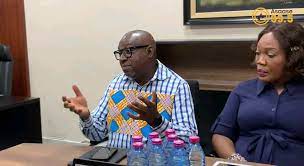The Ghana Independent Broadcasters Association (GIBA) has initiated legal action against the Ministry of Communications and Digitalisation (MoCD) and KNet Ghana Limited, seeking a mandatory injunction to stop the collection of what it terms unlawful fees imposed on broadcasters. The case, filed at the High Court, underscores GIBA’s commitment to upholding transparency, regulatory compliance, and the protection of media freedoms.
The dispute centers on fees charged by the Ministry and KNet Ghana Ltd, which GIBA alleges were imposed without legal basis or parliamentary approval. These include “Contribution Link Fees” and other charges associated with the National Digital Terrestrial Television (DTT) platform. GIBA claims these fees were arbitrarily established and collected under the directive of the former Minister for Communications and Digitalisation, resulting in the disconnection of broadcasters who refused to pay.
Background to the Case
In August 2023, GIBA filed a lawsuit challenging the MoCD’s decision to mandate KNet Ghana Ltd as the exclusive provider of “Contribution Link Services” and authorize the collection of related fees. The association argues that these actions violate statutory requirements and regulatory standards, bypassing necessary parliamentary approvals.
GIBA alleges that KNet, acting with the Ministry’s endorsement, has disconnected broadcasters from the National DTT platform as a punitive measure for non-payment. This, GIBA asserts, poses a significant threat to media freedom and the operations of electronic media services in Ghana.
Key Concerns and Demands
In its latest court motion, GIBA raises several critical concerns:
- Lack of Legal Basis: GIBA argues that the fees have no contractual or statutory foundation, making their collection unlawful.
- Media Freedom: The disconnection of broadcasters undermines the constitutional guarantee of media independence.
- Public Impact: Arbitrary fees could increase broadcasting costs, potentially affecting affordability for consumers.
GIBA’s injunction seeks to:
- Halt the collection of unlawful fees.
- Restore disconnected broadcasters to the National DTT platform.
- Prevent further disconnections by KNet Ghana Ltd pending the court’s decision.
Statement from GIBA
GIBA’s President emphasized the association’s responsibility to safeguard the interests of broadcasters and the public. “This case is about more than fees; it is about restoring accountability and ensuring adherence to the rule of law,” he stated. He also expressed concern over the lack of transparency in implementing these fees, noting that it erodes public trust and fairness in the broadcasting sector.
Broader Implications
The National DTT platform serves as the primary gateway for Free-To-Air television in Ghana. GIBA warns that allowing arbitrary fees could lead to indirect government control over media, jeopardizing smaller broadcasters and diminishing the diversity of voices in the media landscape.
Call for Accountability
Through this legal action, GIBA seeks to reinforce the principle that all institutions, whether public or private, are accountable under the law. The association remains resolute in its mission to promote justice, transparency, and equity within Ghana’s broadcast sector.
The High Court’s decision on the matter is expected to set a significant precedent for regulatory practices and the independence of the media in Ghana.
Source: Thecorporateguardian.com
